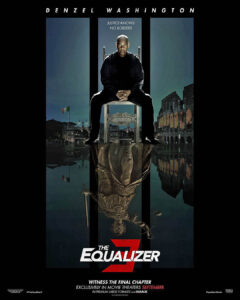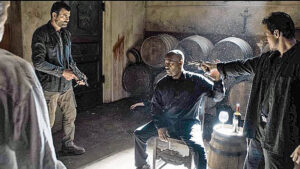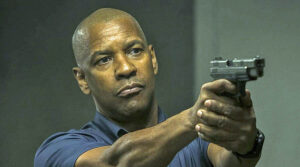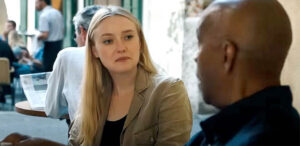 By Steve Crum
By Steve Crum
There are the Universes of Marvel and DC…and then there is Robert McCall, a non-costumed superhero-type who fights—viciously—for the rights of the innocent. Stir in a lot of revenge, and you have The Equalizer 3, the finale of director Antoine Fuqua’s Equalizer trilogy.
It is a lollapalooza. But take that as contextual praise.
 The Equalizer films are known for nail-biting action as well as graphic violence. Beheadings, gunplay and torture are part of the universe for retired international agent McCall. The bad guys take, and he is given to respond. McCall will stop a gunfight by hurling a paper clip, which becomes a lethal weapon unto itself. And he never shows emotion. He knows he will win against any adversary. Sure it is formula heroism, but it works.
The Equalizer films are known for nail-biting action as well as graphic violence. Beheadings, gunplay and torture are part of the universe for retired international agent McCall. The bad guys take, and he is given to respond. McCall will stop a gunfight by hurling a paper clip, which becomes a lethal weapon unto itself. And he never shows emotion. He knows he will win against any adversary. Sure it is formula heroism, but it works.
By the way, that paper clip sequence is found in The Equalizer (2014), the first of the trilogy.
Before focusing on The Equalizer 3, realize that the first best selling Equalizer book was published in 2014. It was based on a 1985-89 TV series of the same name with Edward Woodward as McCall. Since 2021, Queen Latifah has portrayed the vigilante McCall— Robyn McCall—on TV!
Robyn McCall—on TV!
Far more violent than Woodward or Latifah is Denzel’s McCall. In E3, Richard Wenk’s screenplay places a recuperating (from the film’s bloody opening sequence) McCall in a local doctor’s care in the quiet and friendly Italian coastal town of Altamonte. As he befriends the locals, it becomes clear there are high crimes happening to the residents. Drug-running Mafia types have moved in, and are terrorizing the citizens.
Enter Robert McCall. No sooner than he can finally walk without a cane, he begins physically defending the rights of innocent townspeople. Since he a  virtual one-man army, McCall is THE person to have on one’s side. Let the machine guns, bombs and beatings begin. McCall will end the tyranny through his own ninja fighting ways.
virtual one-man army, McCall is THE person to have on one’s side. Let the machine guns, bombs and beatings begin. McCall will end the tyranny through his own ninja fighting ways.
As in previous movies, McCall still has ties to the CIA, particularly Emma Collins (Dakota Fanning), who eventually joins him in Italy.
The production looks good with spot-on cinematography by Robert Richardson, and an effective heartbeat score by Marcelo Zarvos.
But the tempo and polish exist because of Antoine Fuqua and Denzel Washington.
—————
GRADE on an A-F Scale: B+
